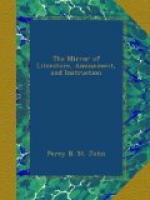Lambeth.
WALTER E.C.
* * * * *
(From another Correspondent.)
In the agreeable communications of your correspondents, they seem in their quotations to have overlooked the following, from Dryden:—
“Secure as when the halcyon breeds,
with these
He that was born to drown might cross
the seas.”
Astraea Redux.
And again, in his stanzas on the death of Oliver Cromwell—
“And wars have that respect for
his repose
As winds for halcyons when they breed
at sea.”
Cowley likewise, in his preface to his Miscellanies, says, talking of his mind, “It must, like the halcyon, have fair weather to breed in.”
The story of Ceyx and Alcyone is beautifully told in Ovid, Met. 11. fab. 10.
* * * * *
HOUSE OF COMMONS.
(For the Mirror.)
In the vale of Evesham, was fought the most memorable battle recorded in the annals of English history, between Simon de Mountfort, the powerful Earl of Leicester, and Prince Edward, afterwards King Edward the First; in which the earl was completely defeated, and the refractory barons, with most of their adherents taken or slain. This important battle restored Henry the Third to his throne and liberty. When he had ascended the throne, he determined to still further curtail the enormous power of the barons; and by his writs summoned together, as his advisers, representatives from numerous cities and boroughs, as well as counties; the battle of Evesham therefore may be considered, says a modern writer, “as the origin of our present House of Commons.”
The learned John Selden says, “All are involved in a parliament. There was a time when all men had their voice in choosing knights. About Henry the Sixth’s time they found the inconvenience, so one parliament made a law, that only he that had forty shillings per annum should give his voice, they under should be excluded.” “In a word (says Chamberlayne) a parliament’s authority is most absolute; a parliament can do all that Senatus populusque Romanus could do, centuriatis Comitis seu Tributis; it represents the whole kingdom, so that the consent of the parliament is presumed to be the consent of every man in England.”
P.T.W.
* * * * *




